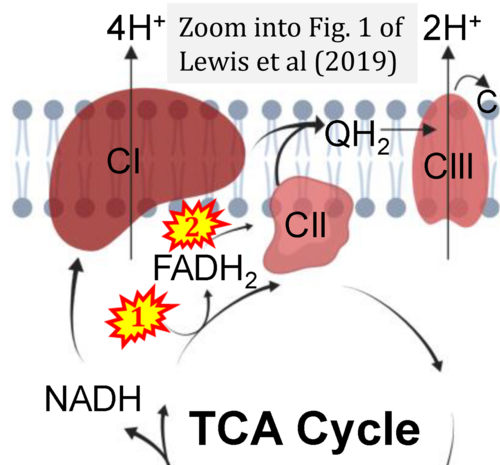Difference between revisions of "Lewis 2019 Int J Mol Sci"
| (One intermediate revision by the same user not shown) | |||
| Line 1: | Line 1: | ||
{{Publication | {{Publication | ||
|title=Lewis MT, Kasper JD, Bazil JN, Frisbee JC, Wiseman RW (2019) Quantification of mitochondrial oxidative phosphorylation in metabolic disease: application to Type 2 diabetes. Int J Mol Sci 20:5271. | |title=Lewis MT, Kasper JD, Bazil JN, Frisbee JC, Wiseman RW (2019) Quantification of mitochondrial oxidative phosphorylation in metabolic disease: application to Type 2 diabetes. Int J Mol Sci 20:5271. https://doi.org/10.3390/ijms20215271 | ||
|info=[https://www.ncbi.nlm.nih.gov/pubmed/31652915 PMID: 31652915 Open Access] | |info=[https://www.ncbi.nlm.nih.gov/pubmed/31652915 PMID: 31652915 Open Access] | ||
|authors=Lewis MT, Kasper JD, Bazil JN, Frisbee JC, Wiseman RW | |authors=Lewis MT, Kasper JD, Bazil JN, Frisbee JC, Wiseman RW | ||
| Line 13: | Line 13: | ||
::::* "Instruments used to measure respiration in isolated mitochondria primarily include Oroboros O2k (Oroboros Instruments) and Seahorse XF Analyzers (Agilent). In the present review, the Oroboros O2k is primarily focused on because of its advantage in accuracy relative to Seahorse XF Analyzers which are designed for high-throughput qualitative measurements [51]" (page 6). | ::::* "Instruments used to measure respiration in isolated mitochondria primarily include Oroboros O2k (Oroboros Instruments) and Seahorse XF Analyzers (Agilent). In the present review, the Oroboros O2k is primarily focused on because of its advantage in accuracy relative to Seahorse XF Analyzers which are designed for high-throughput qualitative measurements [51]" (page 6). | ||
[[File:Lewis 2019 CORRECTION.png|500px|right]] | |||
{{Template:Correction FADH2 and S-pathway}} | |||
: | |||
{{Labeling | {{Labeling | ||
Revision as of 11:06, 22 March 2023
| Lewis MT, Kasper JD, Bazil JN, Frisbee JC, Wiseman RW (2019) Quantification of mitochondrial oxidative phosphorylation in metabolic disease: application to Type 2 diabetes. Int J Mol Sci 20:5271. https://doi.org/10.3390/ijms20215271 |
Lewis MT, Kasper JD, Bazil JN, Frisbee JC, Wiseman RW (2019) Int J Mol Sci
Abstract: Type 2 diabetes (T2D) is a growing health concern with nearly 400 million affected worldwide as of 2014. T2D presents with hyperglycemia and insulin resistance resulting in increased risk for blindness, renal failure, nerve damage, and premature death. Skeletal muscle is a major site for insulin resistance and is responsible for up to 80% of glucose uptake during euglycemic hyperglycemic clamps. Glucose uptake in skeletal muscle is driven by mitochondrial oxidative phosphorylation and for this reason mitochondrial dysfunction has been implicated in T2D. In this review we integrate mitochondrial function with physiologic function to present a broader understanding of mitochondrial functional status in T2D utilizing studies from both human and rodent models. Quantification of mitochondrial function is explained both in vitro and in vivo highlighting the use of proper controls and the complications imposed by obesity and sedentary lifestyle. This review suggests that skeletal muscle mitochondria are not necessarily dysfunctional but limited oxygen supply to working muscle creates this misperception. Finally, we propose changes in experimental design to address this question unequivocally. If mitochondrial function is not impaired it suggests that therapeutic interventions and drug development must move away from the organelle and toward the cardiovascular system.
• Bioblast editor: Gnaiger E • O2k-Network Lab: US MI East Lansing Bazil JN
High-resolution respirometry
- "Instruments used to measure respiration in isolated mitochondria primarily include Oroboros O2k (Oroboros Instruments) and Seahorse XF Analyzers (Agilent). In the present review, the Oroboros O2k is primarily focused on because of its advantage in accuracy relative to Seahorse XF Analyzers which are designed for high-throughput qualitative measurements [51]" (page 6).
Correction: FADH2 and Complex II
- FADH2 is shown as the substrate feeding electrons into Complex II (CII). This is wrong and requires correction - for details see Gnaiger (2024).
- Gnaiger E (2024) Complex II ambiguities ― FADH2 in the electron transfer system. J Biol Chem 300:105470. https://doi.org/10.1016/j.jbc.2023.105470 - »Bioblast link«
Labels: MiParea: Respiration, Exercise physiology;nutrition;life style, mt-Medicine
Pathology: Diabetes
Organism: Human, Rat Tissue;cell: Skeletal muscle
Regulation: Cyt c, Oxygen kinetics, PCr;Cr
Coupling state: OXPHOS
HRR: Oxygraph-2k
BMI


